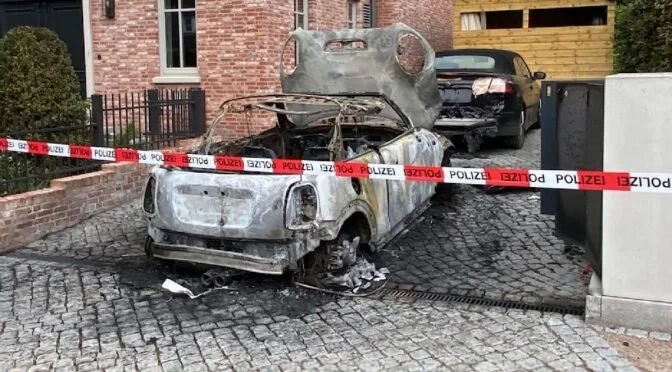German Defense Industry Executive Targeted by Militants Amid Rising Attacks on Arms Sector
Executive Summary
An incendiary device destroyed the personal vehicle of Vincorion CEO Kajetan von Mentzingen outside his Hamburg home in June 2025, with anti-war militants claiming responsibility in a coordinated statement denouncing Germany’s defense sector. The arson is part of a recent surge of targeted attacks on prominent business leaders in the German arms and logistics industries, raising concerns about executive security as public controversy and geopolitical shifts heighten the profile—and risks—of the defense industry.
Key Judgements
Key Judgment 1
The arson attack on Vincorion CEO Kajetan von Mentzingen marks an escalation in anti-militarist direct action in Germany, directly targeting senior defense executives and aligning with a broader trend of ideologically motivated attacks on industry leaders.
Evidence: An anti-war group publicly claimed the attack, linking it to opposition against Germany’s military expansion and increased arms production, while similar incidents targeted other high-profile managers in Hamburg’s logistics and defense sectors.
Key Judgment 2
The growing frequency and publicity of these attacks underscore the rising risks for senior defense and logistics executives, as left-wing militants exploit personal routines and gaps in private security, and as the defense sector’s public visibility grows due to geopolitical developments.
Evidence: Security experts report increased targeting of managers with predictable routines, as recent incidents included multiple burned vehicles and confession letters identifying the business or defense roles of their targets.
Analysis
The targeted arson of Vincorion’s CEO’s car at his Hamburg residence is the latest and most visible manifestation of escalating anti-war militancy in Germany, occurring amid high-stakes public debate over rearmament, defense spending, and the arms industry’s role in European security. Vincorion, which supplies advanced systems for Leopard 2 tanks, Patriot missiles, and other major European and NATO platforms, has recently boasted record revenues, workforce expansion, and new international partnerships—making it a symbolic and strategic target for anti-militarist activists.
The timing of the attack, alongside Germany’s inaugural Veterans’ Day celebrations and public events involving top military and political officials, highlights the activists’ aim to disrupt not just material assets but also the broader social normalization of military power. Their statements frame the attack as a call to arms against “the project to make society fit for war” and specifically denounce what they see as the complicity of business leaders in the militarization of German and European society.
Security experts now warn that German executives—especially in the defense, logistics, and technology sectors—face heightened risks. The nature of recent attacks, which involve careful surveillance and selection of targets in affluent districts, suggests that business leaders must rethink security strategies long after the perceived ebb of left-wing militancy from earlier decades. The lack of comprehensive executive security, contrasted with practices in the United States, leaves senior managers exposed.
Sources
Act for Freedom Now: Hamburg—Fire to the car of a militarist boss
Defence Industry EU: New study highlights importance of the defence industry
Manager Magazin: Violence against managers—How high is the need for protection?
Braunschweiger Zeitung: Heidelberg agrees strategic partnership with defence specialist Vincorion


